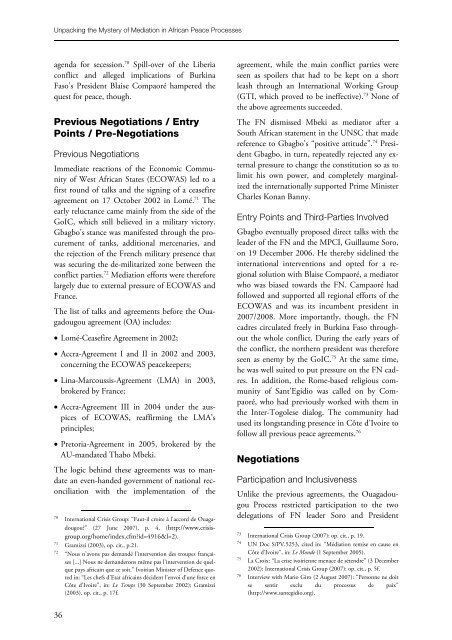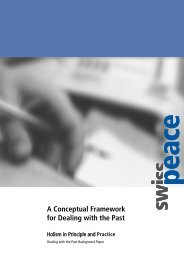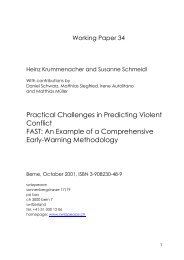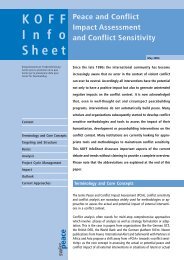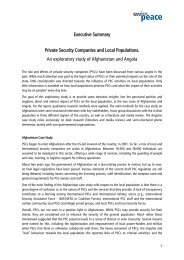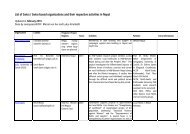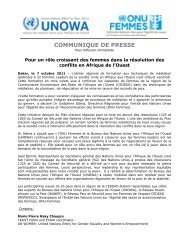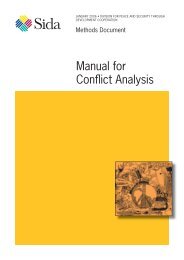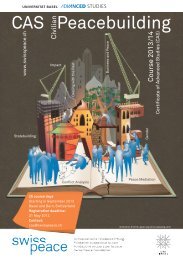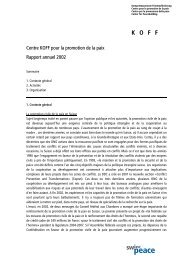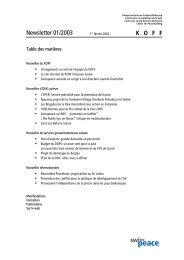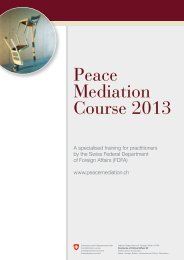Unpacking the Mystery of Mediation in African Peace ... - Swisspeace
Unpacking the Mystery of Mediation in African Peace ... - Swisspeace
Unpacking the Mystery of Mediation in African Peace ... - Swisspeace
Create successful ePaper yourself
Turn your PDF publications into a flip-book with our unique Google optimized e-Paper software.
<strong>Unpack<strong>in</strong>g</strong> <strong>the</strong> <strong>Mystery</strong> <strong>of</strong> <strong>Mediation</strong> <strong>in</strong> <strong>African</strong> <strong>Peace</strong> Processes<br />
agenda for secession. 70 Spill-over <strong>of</strong> <strong>the</strong> Liberia<br />
conflict and alleged implications <strong>of</strong> Burk<strong>in</strong>a<br />
Faso’s President Blaise Compaoré hampered <strong>the</strong><br />
quest for peace, though.<br />
Previous Negotiations / Entry<br />
Po<strong>in</strong>ts / Pre-Negotiations<br />
Previous Negotiations<br />
Immediate reactions <strong>of</strong> <strong>the</strong> Economic Community<br />
<strong>of</strong> West <strong>African</strong> States (ECOWAS) led to a<br />
first round <strong>of</strong> talks and <strong>the</strong> sign<strong>in</strong>g <strong>of</strong> a ceasefire<br />
agreement on 17 October 2002 <strong>in</strong> Lomé. 71 The<br />
early reluctance came ma<strong>in</strong>ly from <strong>the</strong> side <strong>of</strong> <strong>the</strong><br />
GoIC, which still believed <strong>in</strong> a military victory.<br />
Gbagbo’s stance was manifested through <strong>the</strong> procurement<br />
<strong>of</strong> tanks, additional mercenaries, and<br />
<strong>the</strong> rejection <strong>of</strong> <strong>the</strong> French military presence that<br />
was secur<strong>in</strong>g <strong>the</strong> de-militarized zone between <strong>the</strong><br />
conflict parties. 72 <strong>Mediation</strong> efforts were <strong>the</strong>refore<br />
largely due to external pressure <strong>of</strong> ECOWAS and<br />
France.<br />
The list <strong>of</strong> talks and agreements before <strong>the</strong> Ouagadougou<br />
agreement (OA) <strong>in</strong>cludes:<br />
• Lomé-Ceasefire Agreement <strong>in</strong> 2002;<br />
• Accra-Agreement I and II <strong>in</strong> 2002 and 2003,<br />
concern<strong>in</strong>g <strong>the</strong> ECOWAS peacekeepers;<br />
• L<strong>in</strong>a-Marcoussis-Agreement (LMA) <strong>in</strong> 2003,<br />
brokered by France;<br />
• Accra-Agreement III <strong>in</strong> 2004 under <strong>the</strong> auspices<br />
<strong>of</strong> ECOWAS, reaffirm<strong>in</strong>g <strong>the</strong> LMA’s<br />
pr<strong>in</strong>ciples;<br />
• Pretoria-Agreement <strong>in</strong> 2005, brokered by <strong>the</strong><br />
AU-mandated Thabo Mbeki.<br />
The logic beh<strong>in</strong>d <strong>the</strong>se agreements was to mandate<br />
an even-handed government <strong>of</strong> national reconciliation<br />
with <strong>the</strong> implementation <strong>of</strong> <strong>the</strong><br />
70 International Crisis Group: “Faut-il croire à l’accord de Ouagadougou?”<br />
(27 June 2007), p. 4, (http://www.crisisgroup.org/home/<strong>in</strong>dex.cfm?id=4916&l=2).<br />
71 Gramizzi (2003), op. cit., p.21.<br />
72 “Nous n’avons pas demandé l’<strong>in</strong>tervention des troupes françaises<br />
[...] Nous ne demanderons même pas l’<strong>in</strong>tervention de quelque<br />
pays africa<strong>in</strong> que ce soit.” Ivoirian M<strong>in</strong>ister <strong>of</strong> Defence quoted<br />
<strong>in</strong>: “Les chefs d’Etat africa<strong>in</strong>s décident l’envoi d’une force en<br />
Côte d’Ivoire”, <strong>in</strong>: Le Temps (30 September 2002); Gramizzi<br />
(2003), op. cit., p. 17f.<br />
36<br />
agreement, while <strong>the</strong> ma<strong>in</strong> conflict parties were<br />
seen as spoilers that had to be kept on a short<br />
leash through an International Work<strong>in</strong>g Group<br />
(GTI, which proved to be <strong>in</strong>effective). 73 None <strong>of</strong><br />
<strong>the</strong> above agreements succeeded.<br />
The FN dismissed Mbeki as mediator after a<br />
South <strong>African</strong> statement <strong>in</strong> <strong>the</strong> UNSC that made<br />
reference to Gbagbo’s “positive attitude”. 74 President<br />
Gbagbo, <strong>in</strong> turn, repeatedly rejected any external<br />
pressure to change <strong>the</strong> constitution so as to<br />
limit his own power, and completely marg<strong>in</strong>alized<br />
<strong>the</strong> <strong>in</strong>ternationally supported Prime M<strong>in</strong>ister<br />
Charles Konan Banny.<br />
Entry Po<strong>in</strong>ts and Third-Parties Involved<br />
Gbagbo eventually proposed direct talks with <strong>the</strong><br />
leader <strong>of</strong> <strong>the</strong> FN and <strong>the</strong> MPCI, Guillaume Soro,<br />
on 19 December 2006. He <strong>the</strong>reby sidel<strong>in</strong>ed <strong>the</strong><br />
<strong>in</strong>ternational <strong>in</strong>terventions and opted for a regional<br />
solution with Blaise Compaoré, a mediator<br />
who was biased towards <strong>the</strong> FN. Campaoré had<br />
followed and supported all regional efforts <strong>of</strong> <strong>the</strong><br />
ECOWAS and was its <strong>in</strong>cumbent president <strong>in</strong><br />
2007/2008. More importantly, though, <strong>the</strong> FN<br />
cadres circulated freely <strong>in</strong> Burk<strong>in</strong>a Faso throughout<br />
<strong>the</strong> whole conflict. Dur<strong>in</strong>g <strong>the</strong> early years <strong>of</strong><br />
<strong>the</strong> conflict, <strong>the</strong> nor<strong>the</strong>rn president was <strong>the</strong>refore<br />
seen as enemy by <strong>the</strong> GoIC. 75 At <strong>the</strong> same time,<br />
he was well suited to put pressure on <strong>the</strong> FN cadres.<br />
In addition, <strong>the</strong> Rome-based religious community<br />
<strong>of</strong> Sant’Egidio was called on by Compaoré,<br />
who had previously worked with <strong>the</strong>m <strong>in</strong><br />
<strong>the</strong> Inter-Togolese dialog. The community had<br />
used its longstand<strong>in</strong>g presence <strong>in</strong> Côte d’Ivoire to<br />
follow all previous peace agreements. 76<br />
Negotiations<br />
Participation and Inclusiveness<br />
Unlike <strong>the</strong> previous agreements, <strong>the</strong> Ouagadougou<br />
Process restricted participation to <strong>the</strong> two<br />
delegations <strong>of</strong> FN leader Soro and President<br />
73 International Crisis Group (2007): op. cit., p. 19.<br />
74 UN Doc S/PV.5253, cited <strong>in</strong>: “Médiation remise en cause en<br />
Côte d’Ivoire”, <strong>in</strong>: Le Monde (1 September 2005).<br />
75 La Croix: “La crise ivoirienne menace de sétendre” (3 December<br />
2002); International Crisis Group (2007): op. cit., p. 5f.<br />
76 Interview with Mario Giro (2 August 2007): “Personne ne doit<br />
se sentir exclu du processus de paix”<br />
(http://www.santegidio.org).


